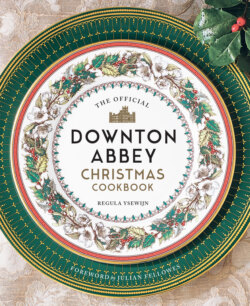Читать книгу Official Downton Abbey Christmas Cookbook - Regula Ysewijn - Страница 10
На сайте Литреса книга снята с продажи.
Оглавление|
17
Introduction
A SEASON OF FEASTING
AND FRIVOLTY
In medieval Catholic Britain, over half of the
days of the year were fast days, with all animal
products—meat, eggs, dairy—prohibited. By the
seventeenth century, the restrictions had been
reduced to the forty days of Lent, Fridays, and
many holy days. Anyone discovered defying the
rule was subject to a fine, which the rich gladly
paid. Fish was allowed, however, and its defini-
tion was surprisingly broad. It included beaver
tail, barnacle geese, and seals—in other words, if
it lived in or near the water, it was fish and there-
fore permitted. But despite the importance of
Christmas on the religious calendar,
meat was allowed on the holiday
table, and so Christmas turned into
the meat-focused feast still enjoyed
today. Indeed, Christmas appeared
to be more about feasting than it
was about the birth of Christ.
The Christmas season begin-
ning in December 1065 was an
eventful one,with the death of King
Edward (Edward the Confessor)
on January 4 and the crowning
of Harold II on January 6. Harold was the first
monarch to be crowned in Westminster Abbey,
which had been consecrated on December 28,
little more than a week earlier. By Christmas
1066, Harold was himself dead, with William I
(William the Conqueror) crowned the new king
on December 25. The following year, William
reportedly hosted a grand Christmas feast in
London to gain the favor of his subjects.
Some 350 years later, Richard II, who had
recently reopened the Parliament’s massive
Westminster Hall (which had been built under
William II in 1097) after ordering an expansion
and various embellishments to the original struc-
ture, hosted a Christmas feast in the hall that
boasted “twenty-eight oxen and three hundred
sheep, and game and fowls without number,feed-
ing ten thousand guests for many days.”The occa-
sion was accompanied by pageants and plays and
other entertainments typical of the time.
During the Christmas season of 1399, the
Earls of Huntington, Kent, and Salisbury, among
others, plotted to gain access to Windsor Castle
under the pretense of holiday guising, where
they hoped to capture Henry IV and restore the
deposed Richard II to the throne. Their planned
rebellion, which became known as the Epiphany
Rising, was thwarted by one of
their own betraying them to the
king, however, who promptly left
London. The conspirators, who
fled to the countryside, all met
a violent end. The imprisoned
Richard also never saw another
Christmas, though exactly how he
met his demise is unknown.
Encouraged by Henry VII,
Italian historian Polydore Vergil,
who spent most of his life in
England, wrote Anglia Historia, a history of
England, which he finished in 1513 but would
not be published for another two decades. In it
he notes that it was the custom of the English
as early as the reign of Henry II (1133 to 1189)
to celebrate Christmas with “plays, masques, and
magnificent spectacles, together with games as
dice and dancing, which . . . were not custom-
ary with other nations.” Vergil also mentions
the appointment of a Lord of Misrule, who was
chosen to oversee the entertainments, which, in
addition to organized events, typically included
wild partying and excessive amounts of drink.
Ssh. We’ll worry about
everything else later, but
for now, let’s just have a
very happy Christmas.
~ SEASON 5, EPISODE 9
